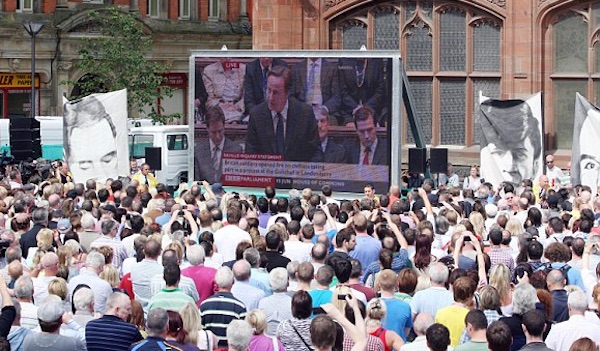
Former British PM David Cameron has been accused of hypocrisy over his Bloody Sunday apology amid efforts to eulogise his legacy following his departure from Downing Street.
People Before Profit Assembly meber Eamonn McCann hit out over gushing political commentary about Cameron, many of which featured his ‘historic’ apology for the Bloody Sunday massacre of 1972, in which 14 civil rights demonstrators were killed.
Mr McCann has accused Cameron of attempting to absolve senior British army officers and politicians of culpability by allowing the ordinary lance-corporals of the Parachute Regiment to shoulder all responsibility for the killings.
“The usual suspect commentators and politicians have been falling over themselves to heap praise on David Cameron for his apology for Bloody Sunday,” said Mr McCann.
“In fact, the apology was predicated on no politician or senior military man having been fingered by Lord Saville. Saville blamed one officer and 10 rank and file soldiers for all the killings and woundings,” he said.
Mr McCann said Mr Cameron, whose apology was beamed onto a big screen in Guildhall Square from Westminster in 2010, gave General Michael Jackson, Brigadier Frank Kitson, Major General Robert Ford, Brigadier Patrick MacLellan, Edward Heath, Lord Carrington, Reginald Maudling, Alec Douglas-Home, among other leading figures of the day, a clean bill of health whilst “damning the men who had pulled the triggers”.
He added: “This was a perfect example of an official inquiry fulfilling its true purpose - of finding small fry to shoulder all of the blame while enabling the real villains to escape scot-free.”
He made controversial claims that some nationalists had facilitated the manoeuvre.
“One of the main reasons Cameron’s ‘apology’ worked, at least for a time, is that influential elements in Northern Nationalism had, in effect, already ‘cleared’ his Commons statement. At least one member of Sinn Fein had discussed the terms of the apology with British officials in advance.
“The deal was that Cameron would acknowledge that all of the dead and wounded had been innocent and would condemn the privates and corporals involved in strong terms. But he wouldn’t have to say a bad word about anybody that the ruling class cared about.
“In exchange, there would be no more Bloody Sunday marches - and no attempt to push on for prosecutions. ‘This is as good as it gets,’ the families were systematically told on their doorsteps in the days after publication of the report..
“At this time, mid-2010, the British authorities were trying to put together an overall deal by which the past would be put in the past and we’d all ‘move on’.
“The stitch-up has unravelled, largely because some family members - Kate and Linda Nash, Liam Wray, Bubbles Donaghey, Mickey Bridge and others - weren’t prepared to accept the deal and opted instead to keep on marching until the original demands of the Bloody Sunday campaign, including prosecutions, had been met.
“Kate, Linda and the others were also conscious of the fact that calling off their campaign would be a kick in the stomach for the bereaved families of other atrocities - Ballymurphy, McGurk’s Bar, Kingsmills, Enniskillen, Birmingham, Loughinisland, etc - who hadn’t yet reached the stage achieved by the Derry campaign.
“The point to keep in mind as Cameron leaves Downing Street to spend more time with his money is that, far from bravely telling the truth about Derry, his Commons statement was just a new and more subtle phase in the efforts of apologists for State violence to escape the verdict of history.
“The proper response to Cameron’s departure is - good riddance.”
Some relatives have now issued a statement in which they deny they were involved in negotiations around the Saville Inquiry. Tony Doherty, John Kelly, Gerry Duddy and Jean Hegarty, who all lost relatives in the 1972 massacre, insisted that there had been no such deal or any discussion of a deal.
In their statement, they said: “The Bloody Sunday march was never discussed with the NIO or Downing Street. To suggest otherwise is fanciful. There was no discussion of the issue of prosecutions. How could there be? None of us, Mr. McCann included, knew at that time what was in the Saville Report.”
![[Irish Republican News]](https://republican-news.org/graphics/title_gifs/rn.gif)
![[Irish Republican News]](https://republican-news.org/graphics/title_gifs/harp.gif)

